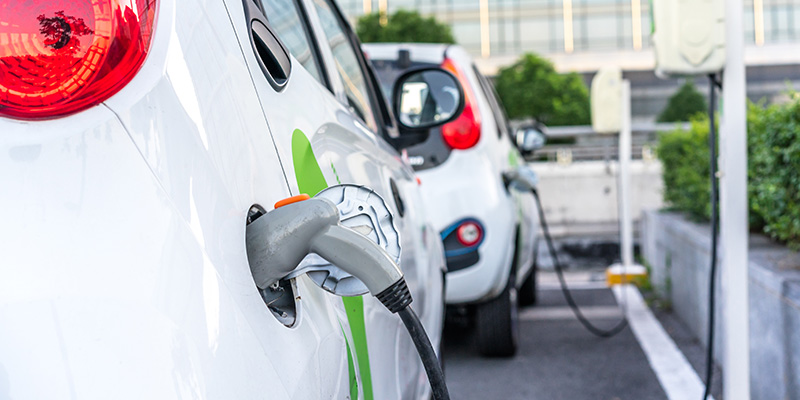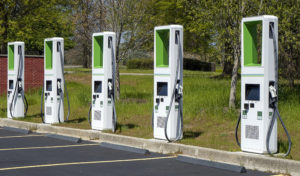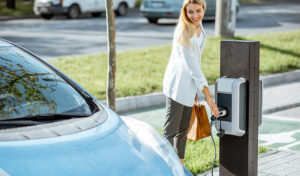HOA Electric Car Charging Policy: Why Have One?

With the rise of electric cars in society, chances are you've probably seen a few of them in your homeowners association. Pretty soon, you will have owners of these vehicles approaching your HOA board to request the installation of charging stations. And, with that, comes the need for an HOA electric car charging policy.
Browse By Category
Sign up for Our Newsletter
With the rise of electric cars in society, chances are you’ve probably seen a few of them in your homeowners association. Pretty soon, you will have owners of these vehicles approaching your HOA board to request the installation of charging stations. And, with that, comes the need for an HOA electric car charging policy.
The Importance of an HOA Electric Car Charging Policy
As electric vehicles continue to surge in popularity, more and more HOAs are beginning to face requests from homeowners asking to install charging stations within the community. And, as with many things in an HOA, the use of these charging stations should come with certain rules. This is where an HOA electric car charging policy comes in.
Although policies can differ from association to association, your charging policy should generally cover three things:
- How homeowners should pay for charging their electric vehicles;
- The proposal process for letting homeowners install their own charging stations; and,
- The schedule of charging station use.
Without a policy in place, homeowners will have no way of knowing how to navigate these three areas of concern. Before long, your board will be bombarded with complaints and disputes. Furthermore, the lack of a policy can also spell disaster for your association in a legal sense.
Understand Your Governing Documents
Considering the number of electric cars in HOA communities is rapidly increasing — especially in more EV-friendly states such as California, Washington, and Florida — homeowners associations must quickly adapt. Unfortunately, older communities usually have more outdated bylaws and CC&Rs that make no mention of electric vehicles. As a result, these communities lack the guidance and provisions they require to govern the installation and management of charging stations.
However, these older communities normally do have provisions concerning exterior modifications or alterations to common areas, and electric car charging stations can fall under that. As such, if your HOA intends to or has already installed charging stations in parking areas or other common spaces, then you can refer to this portion of your governing documents to understand the HOA’s authority over them.
Of course, for that scenario to work, the association must have ownership over the common area in question. The HOA typically can’t install or restrict the use of a common-use charging station in a parking space that legally belongs to a homeowner. As always, it is best for HOA boards to seek help from an attorney or their HOA management company when interpreting their rights, powers, and obligations.
Who Pays for Electric Car Charging Stations?
 If your HOA plans to install one or more charging stations, you must make sure to have room in the budget for them. On average, the cost to install electric car charging stations can range from $850 to $2,200 per piece. Some even go for as much as $4,500 a pop.
If your HOA plans to install one or more charging stations, you must make sure to have room in the budget for them. On average, the cost to install electric car charging stations can range from $850 to $2,200 per piece. Some even go for as much as $4,500 a pop.
A clear advantage of the HOA paying for charging stations is that the association retains ownership over them. That means the HOA can manage and control the operation of the charging station as well as billing concerns.
Of course, this brings up the issue of a potential increase in homeowners’ electricity bills. To ease their worries and avoid this issue, it is worth investing in charging stations that come with advanced software features. These features can separate the cost of electricity used for charging, track users, and charge related fees straight to users’ credit cards.
It is also a good idea to sub-meter the electricity going to the charging station so that it will remain separate from the electricity going to common areas. This will prevent confusion and mistakes in billing.
There is also the question of maintenance and who should pay for them. One option is to include the maintenance costs in the computation of HOA dues. But, that would mean dividing the costs among all homeowners — even the ones who don’t use the charging station. The obvious alternative is to only charge the cost of maintenance to homeowners that use the charging station.
There are many Electric Vehicle Service Providers (EVSP) that install electric car charging stations for condos and HOAs. These providers usually take care of maintenance issues and expenses. In addition, they also take responsibility for collecting payments from individual homeowners that use the charging station.
Allowing Homeowners to Install Their Own Stations
If your association does not like the idea of installing charging stations in common areas or paying for them using HOA funds, then you should consider allowing homeowners to install stations themselves. In fact, many states protect homeowners’ right to charge. California law, for instance, does not allow HOAs to prohibit homeowners from installing a charging station on their own property or parking space.
A huge benefit of taking this route is that the association does not need to shoulder any related expenses. The cost of installing and maintaining the charging station purely rests on the homeowner’s shoulders. Of course, if a homeowner wishes to install a station in their driveway, they may run into a problem with the association.
Charging stations may be considered exterior alterations, which are subject to approval from the board or the Architectural Review Committee. Homeowners are probably better off installing the charging station in a parking space they own in a common area like a parking lot or garage.
If there are a lot of electric vehicle owners in your community, though, it is wiser and easier for the association to install multiple stations and retain ownership over all of them.
Homeowner Proposal Process
It is important to include a proposal process within your HOA electric car charging policy. Establishing a written policy for how to handle charging stations will ensure consistent enforcement and compliance across the community.
This policy should ask homeowners to fill up an application form and submit a detailed plan for the installation. As an added requirement, you can stipulate that the plan must have been designed by a licensed and insured contractor. Furthermore, you must make it clear to homeowners that they must cover all the costs related to the installation and maintenance of the charging station. After you have reviewed their application, the installation process may begin.
Schedule of Charging Station Use
Communities and apartments with electric charging stations often run into scheduling problems. If there are five homeowners with electric vehicles in your HOA and only one common charging station, who should have priority of use?
One way of resolving this issue is to adopt a reservation system. Electric car owners can reserve slots for charging their vehicles, and you can avoid potential disputes. Another way is to implement a first-come, first-served policy, which is a system that many associations use. Regardless of which route you take, you must make it clear that this is how your HOA or condo electric car charging policy works.
Of course, if you live in a community with tons of electric vehicles, you may want to consider installing a few charging stations to accommodate them. Alternatively, you can pass on the responsibility of installing charging stations to individual owners.
A Common Hurdle Among HOAs and COAs
Infrastructure problems are the most common issues associations face when it comes to installing charging stations. High-rises, in particular, encounter engineering troubles because their infrastructure may not be strong enough. Make sure the electric car charging stations condominiums and HOAs install won’t deal any long-term or short-term damages.
Charging stations require two things — a parking slot for the station itself and an outdoor-rated level 2 power outlet. And those requirements only apply to a single charging station. If your HOA will install multiple stations in one location, one of those parking spaces must comply with ADA regulations. Your association must meet these demands. Otherwise, there is no point in considering charging stations for your common areas in the first place.
Keep Up With the Times
 With electric vehicles becoming more and more common these days, homeowners associations must not lag behind. First, consider whether or not your common areas can accommodate charging stations. After that, you must evaluate the cost and determine if you want the HOA to retain ownership. Your HOA electric car charging policy must also tackle fees, schedules, and a proposal process for homeowners.
With electric vehicles becoming more and more common these days, homeowners associations must not lag behind. First, consider whether or not your common areas can accommodate charging stations. After that, you must evaluate the cost and determine if you want the HOA to retain ownership. Your HOA electric car charging policy must also tackle fees, schedules, and a proposal process for homeowners.
All homeowners associations need help every once in a while. Start looking for the best HOA management company in your area today. Use our online directory for fast and reliable results.
RELATED ARTICLES:
- Everything You Should Know About Condo Maintenance
- Should Having Service Animals In An HOA Allowed?
- Can Homeowners Get A Traffic Ticket In An HOA?
Trending Now
Related Article
Sign up for Our Monthly Newsletter
Sign up below for monthly updates on all HOA Resource
















